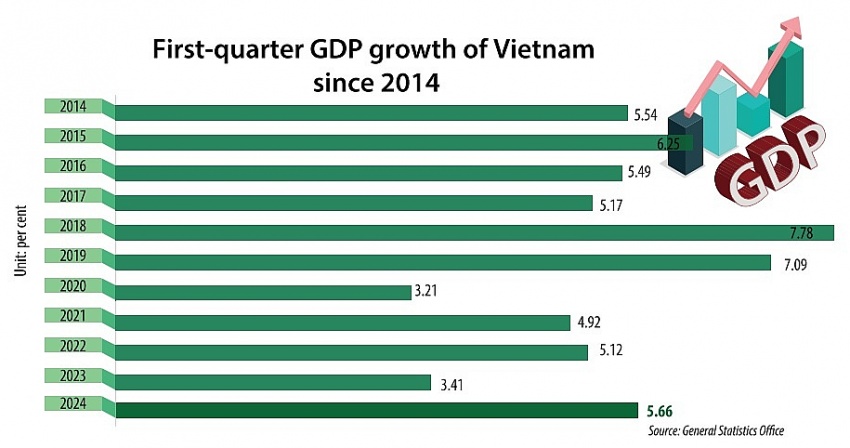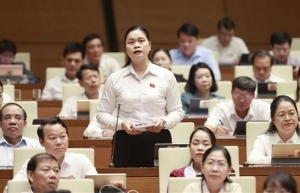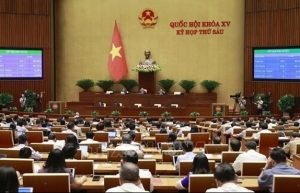Pro-business solutions to build on rising confidence
Following a few years of halted operations due to the coronavirus pandemic, Hanoi-based Red Lotus Trading Company resumed its trading in farm produce and home appliances late last year.
Company director Tran Hai Van said she expected her business will still need a long time to recover. “Though our sales have begun to bounce back, it is still far lower than what we earned in the past,” Van said. “Previously, our revenue could grow 15-20 per cent a year, but the rate was only 5 per cent last year and about 6 per cent on-year in the first three months of 2024.”
In April, Van will fly to Japan to work with two partners to negotiate contracts involving the import of home appliances into Vietnam.
Elsewhere at Hanoi Garment Materials Production JSC, production has also been resumed since last year following massive financial difficulties.
“We used to be bogged down in a debt of VND50 billion ($2.08 million), and we have paid off two-thirds of it,” said Nguyen Thang, a company representative. “We have recently landed some contracts with a number of domestic and foreign partners.”
The company’s revenue grew 5 per cent last year, and about 6 per cent in Q1 of this year. This is far lower than the rate of an average 18 per cent on-year earned before 2019.
 |
| Pro-business solutions to build on rising confidence, illustration photo/ Source: Shutterstock |
Production rebounding
According to the General Statistics Office (GSO), manufacturers have been making efforts in seeking orders to fulfil their production and business plans for 2023 and to prepare goods for growing demands in 2024. In Q1, industrial production has continued its positive trend.
“One of the growth’s biggest drivers is local production surging, especially industrial production,” said GSO general director Nguyen Thi Huong.
In Q1, the industrial added value climbed 6.18 per cent on-year, far higher than the first-quarter reduction of 2.2 per cent in the same period of last year.
In an example, after more than two years of preparations, Tran Manh Dung has decided to expand his company’s operations in Hanoi to churn out furniture products, in addition to his existing production of metal products which has fetched him a quarterly 10-12 per cent growth rate since late 2022.
“These two types of products can add strength to each other. We hope to have a stable 14 per cent growth rate in each quarter this year,” said Dung, director of Manh Dung Mechanics JSC in the suburbs of the capital.
The optimistic performance of Dung’s firm mirrors the general confidence of Vietnam’s business community to the country’s brighter prospects this year.
“The Vietnamese government has carried out a suite of measures designed to attract investments. These include tax incentives, preferential tariffs, and streamlined bureaucratic processes,” said Marko Walde, chief representative of AHK in Vietnam, Myanmar, Cambodia and Laos. “What is more, transparent regulatory frameworks protect investors’ interests and provide a stable foundation for long-term collaboration.”
According to Walde, in the tapestry of global investment, Vietnam emerges as a shimmering thread, drawing the attention of German manufacturing giants seeking to weave their success story in its vibrant landscape. For years, Vietnam has been a magnet for German investors, offering a blend of opportunity, innovation, and growth potential that captivates the entrepreneurial spirit.
Cumulatively as of March 20, Vietnam was home to 469 valid projects from Germany, registered at $2.75 billion.
In its recent global research report on Vietnam’s GDP amid rising inflation, Standard Chartered Bank forecasts Vietnam’s Q1 GDP growth to moderate to a still-strong 6.1 per cent on-year from 6.7 per cent in Q4 2023. The bank remains 2024 GDP growth forecast at 6.7 per cent, and a growth rate accelerating from 6.2 per cent in H1 to 6.9 per cent in H2.
Tim Leelahaphan, economist for Thailand and Vietnam at Standard Chartered Bank, said, “Despite the likely Q1 slowdown, we think Vietnam’s recovery remains intact. However, we are cautious on the H1 growth outlook due to headwinds to global trade.”
 |
Overcoming hardship
The Vietnamese economy grew 5.66 per cent in Q1, higher than the on-year rise of 3.41 and 5.12 per cent in the same periods of 2023 and 2022, respectively. “The economic growth is gradually bouncing back thanks to gradual recovery of industrial production, retail, and consumption,” the GSO said.
In the first three months, as compared to the same period last year, the processing and manufacturing sector, which creates more than 80 per cent of industrial growth, ascended nearly 7 per cent. The mining sector declined 4.84 per cent; the electricity production and distribution sector expanded nearly 12 per cent; and the sector of water supply, wastewater, and waste treatment increased 5 per cent.
Figures from the Ministry of Planning and Investment showed that in March, nearly 14,100 enterprises were newly established, up 64.3 per cent on-year.
In the first three months, Vietnam saw over 36,200 enterprises of the type registered at $13.84 billion, using nearly 258,800 workers. This was up by 6.9 per cent in the number of enterprises, 7 per cent in registered capital, and 22 per cent in the number of employees – as compared to the same period last year.
If another $16.34 billion registered by 9,700 operational enterprises is included, the total capital supplemented into the economy in the period was $30.18 billion.
However, the GSO reported that the first three months of this year saw 53,400 businesses with halted operations – up 24.5 per cent as compared to the corresponding period last year; 15,500 enterprises stopped operations and waited for dissolution procedures – up 21.7 per cent; and 5,100 enterprises completed such procedures. On average, nearly 24,700 businesses left the market each month.
At a government meeting last week, Prime Minister Pham Minh Chinh stated, “We must make greater efforts to revive the economy. At present, enterprises and individuals are still in big difficulties,” PM Chinh said.
The government in 2024 has set out a mission in boosting administrative reform to “create new values, new impetuses, and new success”, with the public and enterprises being the biggest beneficiaries. Efforts are to be made to remove and decrease at least 10 per cent of compliance costs for administrative procedures and business regulations.
In 2024, the government will complete all decentralising of administrative procedures that are subject to the power of government and prime minister, ensuring that at least 70 per cent of public services will be provided online and the rate of people performs such services will be at least 40 per cent.
Ministries and sectors have been ordered to review all business conditions, and propose the removal of conditional business conditions in the sectors that can apply other more effective management solutions. This task has to be completed before June.
“They are also ordered to promptly review and propose the eradication of business conditions that are unnecessary, infeasible, unclear, difficult to determine, and unsuitable to the reality,” read a conclusion from the seventh meeting of the government’s Steering Committee on Administrative Reform in February. “Additionally, they have to annul all unnecessary certificates, and reduce certificates overlapped in content, and this task has to be completed in Q4 of 2024.”
The government expects that the economy will grow 6-6.5 per cent this year, meaning that more efforts are to be made in coming months.
Meanwhile, Tran Hai Van from Red Lotus Trading Company said she believes the economic situation will get better, meaning companies will be able to sell more goods and earn more money.
“We are expecting more sales to go this summer as this means a bigger income. Our income also depends on how the sales go,” Van said. “We are making plans to continue increasing the revenue in the following quarters thanks to more convenient conditions.”
 | Government to consider 23 trillion VND support package for workers: Finance Minister A package worth about 23 trillion VND (980 million USD) from the Unemployment Insurance Fund is designated to offer workers further support, Finance Minister Ho Duc Phoc said at National Assembly’s Q&A session on June 6 morning. |
 | Business support to boost 2024 goals With economic growth this year forecast to fall below the set target, the government has devised a new growth goal for next year, which will be realised by greater support for businesses. |
What the stars mean:
★ Poor ★ ★ Promising ★★★ Good ★★★★ Very good ★★★★★ Exceptional
Related Contents
Latest News
More News
- State corporations poised to drive 2026 growth (February 03, 2026 | 13:58)
- Why high-tech talent will define Vietnam’s growth (February 02, 2026 | 10:47)
- FMCG resilience amid varying storms (February 02, 2026 | 10:00)
- Customs reforms strengthen business confidence, support trade growth (February 01, 2026 | 08:20)
- Vietnam and US to launch sixth trade negotiation round (January 30, 2026 | 15:19)
- Digital publishing emerges as key growth driver in Vietnam (January 30, 2026 | 10:59)
- EVN signs key contract for Tri An hydropower expansion (January 30, 2026 | 10:57)
- Vietnam to lead trade growth in ASEAN (January 29, 2026 | 15:08)
- Carlsberg Vietnam delivers Lunar New Year support in central region (January 28, 2026 | 17:19)
- TikTok penalised $35,000 in Vietnam for consumer protection violations (January 28, 2026 | 17:15)

 Tag:
Tag:


















 Mobile Version
Mobile Version